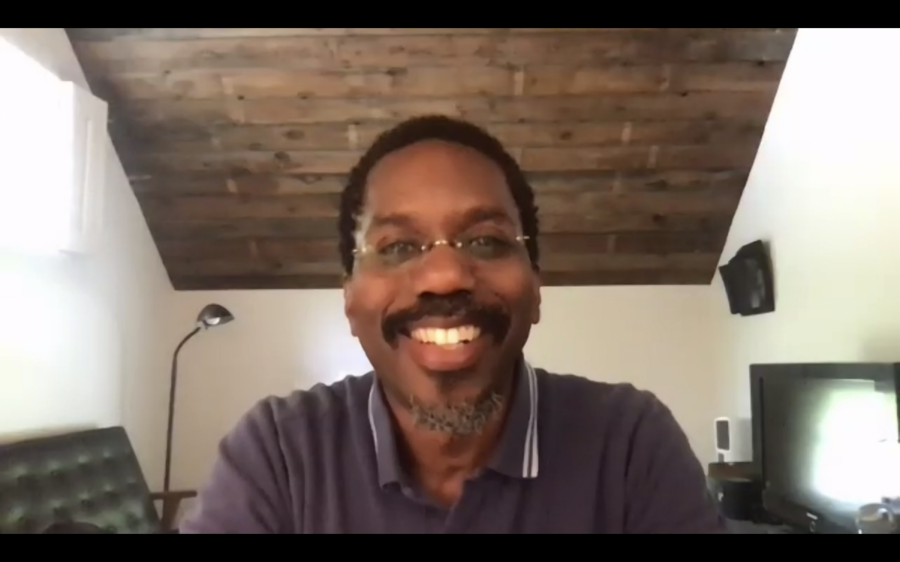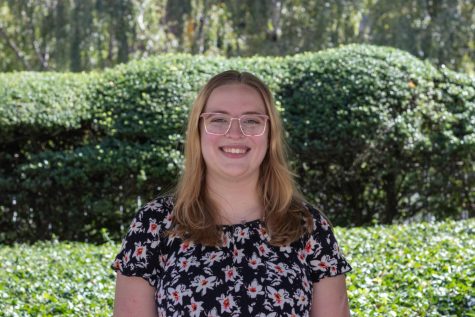Fordham Law Holds Discussion on Race and Protesting Injustice
ZOOM
Professor Bennett Capers speaks about the ongoing protests and the impact young people can have.
June 19, 2020
Surrounded by the demonstrations across the United States to protest the racial injustices by police officers to Black people, the Fordham Law School hosted a discussion on Zoom. The event, titled “Protest, Police Violence, and the Pandemic,” was held on June 10. Catherine Powell, professor of law at Fordham Law School, moderated the panel of speakers and led a conversation on the murder of George Floyd, race, safe protests and the effect of the Black Lives Matter movement across the world.
“(George) Floyd’s death has sparked a national and international response in large demonstrations in big and small cities in support of Black Lives Matter and a broader conversation about the chronic problem of systemic racism and White Supremacy in the United States,” the event’s Instagram post stated.
One of the panelists, Professor of Law at Fordham Law School Gay McDougall, is a Distinguished Scholar in Residence at the Leitner Center for International Law and Justice and Center on Race, Law and Justice at Fordham Law School. She additionally served on the United Nations (U.N.) as an expert on minority issues for six years. Professor of Law at Fordham Law School Bennett Capers was the second panelist. Capers recently joined Fordham Law School as a professor of law and co-director of the Center on Race, Law and Justice.
The Zoom call lasted for an hour and a half, with the first part dedicated to Powell asking McDougall and Capers questions. Powell began by expressing how widespread the protests are.
“Last week, 40,000 people protested on the streets of Paris. We’ve seen spray painted graffiti ‘I can’t breathe’ in Idlib, Syria,” Powell said. “In cities across Europe, Australia, the Middle East, Africa, Asia, Brazil, Mexico, the Caribbean. These protests have gone global.”
Capers and McDougall then explained how these protests are different from previous ones and the importance of the protests. Caspers explained that at first, the protests felt very “déjà vu,” as there has always been blue-on-Black violence, referring to the police brutality that affects Black people. However, he believes this moment to be different because of the reach and diversity of the protests and attendees.
“I think what’s different now is … the recognition that blue-on-Black violence is not just a Black problem, it’s an American problem,” Capers stated.
McDougall said that one thing she views as being different is the widespread disdain for Donald Trump across the globe. Another difference she has noticed is that the U.N. now has more influence from African countries in councils such as the U.N. Human Rights Council.
The protests, Capers hopes, are helping people understand how the system works. He informed the audience that police officers are given rules to arrest people but no specifics on how much force they can use. Additionally, Capers explained that very few police officers are prosecuted because prosecutors work with the police and need the support of police officers to be elected.
The conversation then shifted to focus on the police brutality that has been occurring during the protests. The use of tear gas on peaceful protesters was compounded by Trump’s anger at governors for refusing to dominate peaceful protests, according to Capers.
McDougall explained that many do not want to speak out against police brutality because they want to protect their ability to use violence in protests in their countries.
The final part before audience questions focused on reformation. Capers explained that reforms such as “8 Can’t Wait” are actually damaging because it may “seem like a fine start but also seem like putting a Band-Aid on a much larger issue.”
He emphasized that the approach of defunding the police does not mean getting rid of the police but rather rethinking police from the ground up. Capers explained that the defunding would involve reallocating money and demilitarizing the police, an approach which would differ depending on location
“As long as the protests continue, we are going to have an opportunity to make real change,” McDougall stated about defunding the police. “We got to go for the most fundamental, bottom-up change that we can put in place.”
McDougall explained that there is an appeal letter asking for the U.N. Human Rights Council to hold a special session to consider the violations in the U.S. These violations include racism, the handling by the police of the protests and the killing of George Floyd. The letter has been signed by the families of George Floyd, Breonna Taylor and Philando Castile. Additionally, it has been signed by over 670 human rights groups.
The second portion of the event focused on audience questions. The majority of questions focused on how students can help and what they can do. An anonymous Fordham student asked, “What can we do to really seize the moment?”
Powell, Capers and McDougall emphasized that students should be committed to examining society and the laws. Additionally, all three recommended books for students to read.
“I really want young people to tell me what to do. You young people have so much power and I think sometimes we make them think they are powerless when they have power they don’t recognize,” Capers stated. “And I really want more young people to push back against us and give us ideas and tell us what they want and keep nudging us until we do it. Or do it themselves.”













